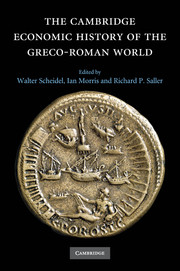Book contents
- Frontmatter
- 1 Introduction
- Part I Determinants of Economic Performance
- Part II Early Mediterranean Economies and the Near East
- 7 The Aegean Bronze Age
- 8 Early Iron Age Greece
- 9 The Iron Age in the Western Mediterranean
- 10 Archaic Greece
- 11 The Persian Near East
- Part III Classical Greece
- Part IV The Hellenistic States
- Part V Early Italy and the Roman Republic
- Part VI The Early Roman Empire
- Part VII Regional Development in the Roman Empire
- Part VIII Epilogue
- Bibliography
- Index
- Map 1.1 The Mediterranean basin"
- Map 10.1 Greek and Phoenician trade in the period of the Persian Wars"
- Map 11.1 The Achaemenid empire"
- Map 12.1 Greece and Asia Minor"
- Map 15.1 The Seleucid empire"
- Map 16.1 Greco-Roman Egypt"
- Map 20.1 The Roman empire at the accession of Vespasian"
- References
9 - The Iron Age in the Western Mediterranean
from Part II - Early Mediterranean Economies and the Near East
Published online by Cambridge University Press: 28 March 2008
- Frontmatter
- 1 Introduction
- Part I Determinants of Economic Performance
- Part II Early Mediterranean Economies and the Near East
- 7 The Aegean Bronze Age
- 8 Early Iron Age Greece
- 9 The Iron Age in the Western Mediterranean
- 10 Archaic Greece
- 11 The Persian Near East
- Part III Classical Greece
- Part IV The Hellenistic States
- Part V Early Italy and the Roman Republic
- Part VI The Early Roman Empire
- Part VII Regional Development in the Roman Empire
- Part VIII Epilogue
- Bibliography
- Index
- Map 1.1 The Mediterranean basin"
- Map 10.1 Greek and Phoenician trade in the period of the Persian Wars"
- Map 11.1 The Achaemenid empire"
- Map 12.1 Greece and Asia Minor"
- Map 15.1 The Seleucid empire"
- Map 16.1 Greco-Roman Egypt"
- Map 20.1 The Roman empire at the accession of Vespasian"
- References
Summary
introduction
The economic history of the Iron Age in the western Mediterranean is a complex tale in which encounters and entanglements between diverse indigenous peoples and foreign agents from several expanding states of the eastern and central Mediterranean played a recurrent and crucial role. The chronology, nature, and consequences of these encounters have been the subject of a great deal of historical and archaeological research for many years. The last decade, in particular, has witnessed not only a significant increase in the quantity of archaeological data bearing on these issues, but a transformation of interpretive perspectives and theoretical discussion. However, despite these improvements, there remain major gaps in, and problems with, the data that present serious difficulties for writing economic history.
One significant problem with the important, but patchy, textual record is that it comes almost exclusively from one of the several foreign colonial agents involved in the region (i.e. Greek sources). This has resulted in a tradition of strongly Hellenocentric historiography. But Greek economic history in the western Mediterranean can be properly understood only if it is contextualized within a larger social landscape in which Greeks were, in many instances, of marginal importance (except to themselves). Moreover, it must be recognized that Greeks were as much transformed as they were agents of transformation in the dynamic history of encounters in the region.
Keywords
- Type
- Chapter
- Information
- The Cambridge Economic History of the Greco-Roman World , pp. 242 - 276Publisher: Cambridge University PressPrint publication year: 2007
References
- 11
- Cited by

